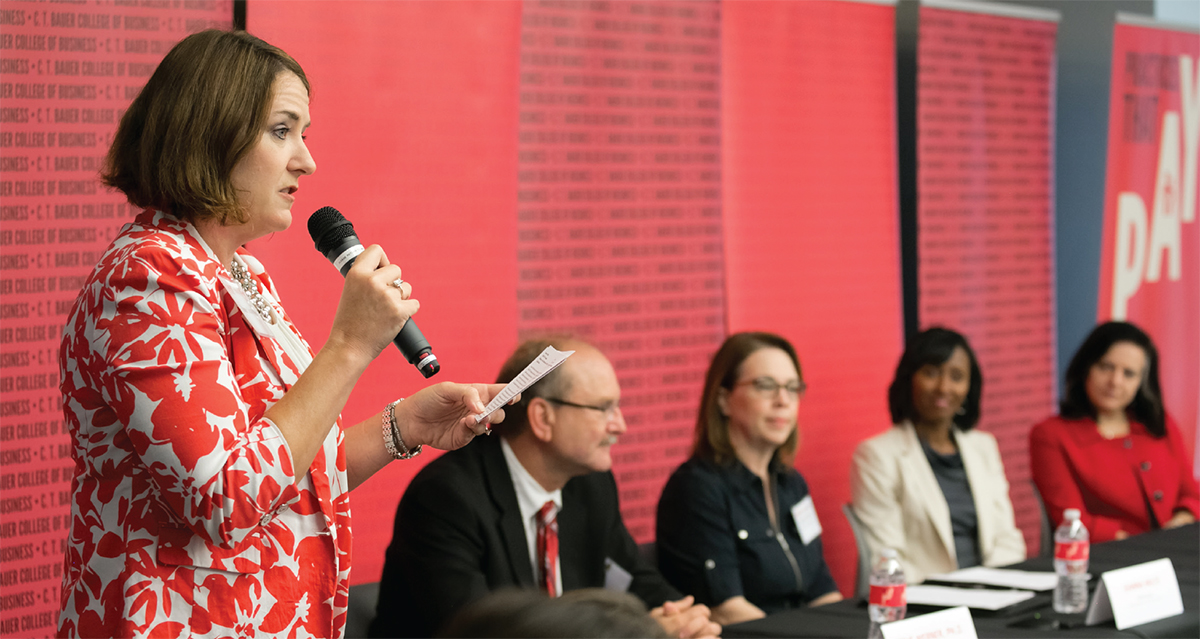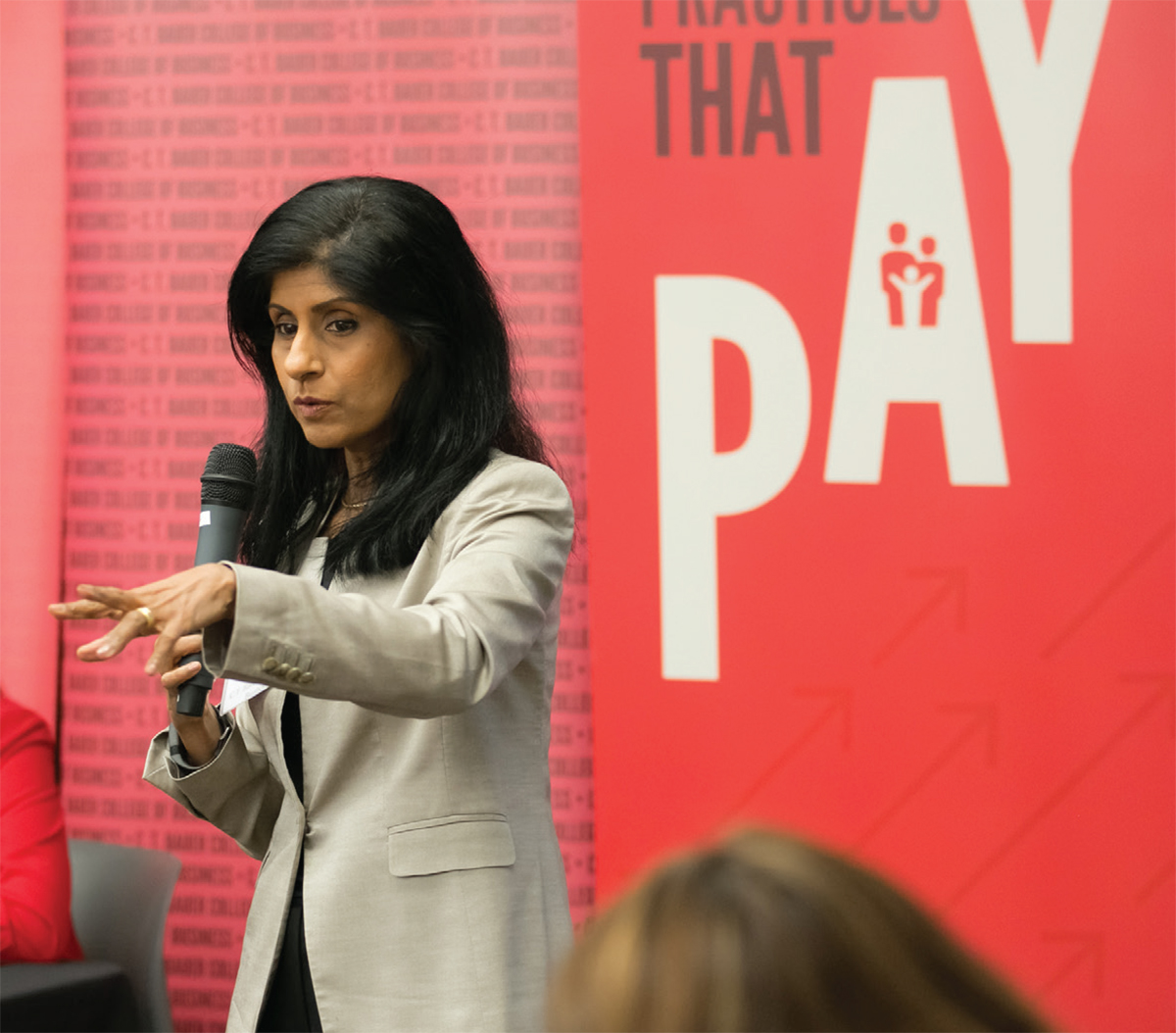
Programs
PRACTICES THAT PAY
Bauer college highlights changing workforce needs in panel discussion

MODERATOR DIANE SCARDINO, VICE PRESIDENT OF TEXAS CHILDREN’S HOSPITAL, POSED QUESTIONS ABOUT FAMILY-FRIENDLY POLICIES TO THE PANEL, WHICH INCLUDED, FROM LEFT, PROFESSOR STEVE WERNER, SHELL OIL COMPANY MANAGER JOANNA NOLTE, KPMG MANAGING PARTNER TANDRA JACKSON AND WINSTON & STRAWN MANAGING PARTNER LINDA COBERLY.
LEARN MORE: Working Families Inititaive →

This is just the beginning — our real goal is what comes next.
LATHA RAMCHAND, BAUER COLLEGE DEAN
Although family-friendly policies are generally viewed favorably in corporate America, the rhetoric often doesn’t match the reality.
“When we look at the numbers of family-friendly policies, a lot of organizations just don’t have very many of them,” Bauer College Professor Steve Werner said. “There are general policies, like being able to bring your child to work in an emergency, that only one in four companies have.”
Academic research, he added, shows that of the approximately 60 policies identified as family-friendly, there are three that about half of companies have in place — telecommuting, flextime and a paid leave bank.
Werner shared those statistics at an on-campus “Practices That Pay” panel event this summer, presented by Bauer College’s Working Families Initiative. In addition to Werner, the group included representation from industry, with Texas Children’s Hospital Vice President Diane Scardino serving as moderator along with Winston & Strawn LLP Chicago managing partner Linda Coberly, KPMG managing partner Tandra Jackson and Shell Oil Company Equal Opportunity and U.S. Diversity & Inclusion manager Joanna Nolte rounding out the panel.
Led by Bauer College Board member and alumna Elizabeth Killinger, who is president of NRG Retail and Reliant, the Working Families Initiative includes faculty, staff and business leaders. Killinger provided opening remarks at the event.
“The objective for today is that we all walk away a little wiser and a little more educated on what it looks like to be in a family-friendly culture, thriving in both the workplace and our families,” she said.
Scardino moderated by posing three questions to panelists and opening the discussion to audience questions. The event also featured two large screens displaying the online conversation on Twitter, with the hashtag #PracticesThatPay.
A Family-Friendly Culture
Scardino’s first question focused on the panelists’ perspectives on what makes a family-friendly culture and how business leaders and professionals can model that behavior.
“It starts with a culture that values diversity and inclusion,” Nolte said. “Each person is unique. We define inclusion as creating the type of environment where all differences are valued and respected, and that’s our baseline.”
She added: “Leaders should be sensitive to the needs of others and not make assumptions about what people need. They need to be flexible and adaptive, listening to your issues and coming back with solutions.”
Jackson agreed, emphasizing the importance of leadership by example, especially when it comes to establishing an organization’s family-friendly culture.
“You have to have that tone at the top,” she said. “Your organization has to have that flexibility that is inherent to really drive and set the stage for that type of culture.”
Coberly noted that family-friendly policies can’t be one-size-fits-all, adding that in most law firms, staff have different circumstances than the lawyers employed there.
She said: “Those two populations have very different issues. For our staff, it’s not work that lends itself to very flexible work arrangements because it’s a service role supporting a law practice. And for our lawyer population, we’re working against a culture of high performance that involves billable hours, which adds a lot of complexity. What we can do, though, is convey that our firm sees its investment in professionals as a long-term proposition, and we understand that people go through phases in their careers, and there are periods in your life when you need to step back a little and attend to needs at home.”
It’s about making sure both leaders and employees are respectful of the fact that we all have lives outside of work. Whether it’s raising children, taking care of aging parents or pursuing your interests and passions within the community, all of this makes for a whole, healthy employee.
PRACTICES THAT PAY PANELIST TANDRA JACKSON, KPMG MANAGING PARTNER
Although their responses reflected their experiences working in different industries, the panelists agreed that one commonality is required to develop a family-friendly workplace — respect across organizations.
Werner said: “For most people, their relationship to management is their first immediate supervisor. So, even if top management is very supportive, if the immediate supervisor is negative toward using these policies, you don’t have a family-friendly culture. The other thing that affects the culture is coworker support. Being derided for using these policies also can make an employee feel that they don’t have a family-friendly culture (in the organization).”
“It’s about making sure both leaders and employees are respectful of the fact that we all have lives outside of work,” Jackson said. “Whether it’s raising children, taking care of aging parents or pursuing your interests and passions within the community, all of this makes for a whole, healthy employee.”
Technological advances are helping to support organizations in being more flexible with how employees work, she added.
“There are lots of different ways now to accomplish outcomes,” Jackson said. “How you do it and where you do it may not always be the most important thing.”
Responding to Changing Needs
Coberly, Jackson and Nolte shared what their respective organizations have done to respond to the changing workforce.
“There are certain kinds of policies you just have to have,” Coberly said. “A family-leave policy communicates an acceptance that people go through different phases in their lives. We also offer coaching to people returning from leave that is complimentary and paid for by the firm. We have a backup childcare arrangement with a local orga- nization, and we have a pretty robust employee assistance program as well.”
Winston & Strawn recently removed gender-based distinctions from its parental leave policy for lawyers, she said. The old policy offered 18 paid weeks for maternity or “primary caregiver” leave and 10 paid weeks for “secondary caregiver” leave, while the new policy offers up to 20 paid weeks of leave without distinction.
“This concept of distinguishing between primary and secondary caregiver doesn’t make any sense in a two- career family,” Coberly said. “You divide it up however you divide it up. In some cases, my husband is a primary caregiver, and in other things, I am the primary.”
At Shell, Nolte said, employees can work a 9/80 schedule, meaning that they work 80 hours over nine days, instead of the traditional 10, or use flextime to structure their workdays around family obligations.
“People can start their day as early as 6 a.m. and finish much sooner to be home at a certain time with their children,” she said. “We offer a compressed workweek, temporary dependent care leaves, telecommuting, many kinds of personal leave and job-sharing. We also allow employees to purchase vacation, so if you start with Shell and don’t have much vacation (accrued) from your experience, you can buy time you may need.”
The company also offers its employees wellness reimbursements, adoption assistance and backup care for children and adults, along with services like banks, drycleaners, workout facilities and daycares in some campuses, Nolte said.
Avoiding Pitfalls
Scardino also asked panelists about pitfalls in imple- menting these types of policies and what leaders should avoid.
“It’s a mistake (for leaders) to think these policies shouldn’t evolve or change,” Nolte said. “Don’t think of these things as static. You’ve got to keep in touch with the needs of your workforce, with what’s happening externally and what the best practices are.”
Jackson echoed the idea that developing a family- friendly workplace isn’t a “one-and-done effort.”“It is a continuous journey,” she said. “At KPMG, we’ve been on this journey for many years, being an employer of choice and engaging our team. We have senior leadership, our management committee and our board at the top, saying this is important.”
She added: “Then, it has to continuously cascade down to our partners and move down the chain. It takes continuous repetition that this is important, this is what we’re about, and this is the kind of culture we have.”
Ongoing evaluation of the effectiveness of these policies is also important, Nolte added.
She added: “Then, it has to continuously cascade down to our partners and move down the chain. It takes continuous repetition that this is important, this is what we’re about, and this is the kind of culture we have.”
Ongoing evaluation of the effectiveness of these policies is also important, Nolte added.
